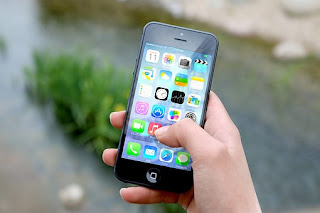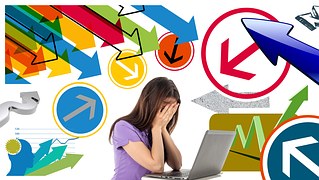“Powering Off” or “Power On?”
Do you take your laptop on holiday? Do you sometimes “hate” your mobile phone?
Harris Interactive recently reported that one-third of business people take their laptops on holiday. During a Sunday meal at a restaurant recently, I observed a man sitting with his family talking on his mobile phone -- obviously about business. He was not happy – neither was his family!
To paraphrase Charles Dickens, “It is the best of times. It is the worst of times.” Certainly that applies when it comes to “connectivity.” Stories of 9-11 victims being able to communicate with family members in the last minutes of their lives warmed my heart, while the story my friend told of her mother answering her mobile phone in the delivery room during the birth of her grandchild chilled my soul.
How grateful I was for my mobile phone when I came across someone with one, and I could immediately help them get help. How convenient it is on holiday to use the Internet to explore the options for entertainment in the area on a rainy afternoon, and get directions to find it easily. How comforting to know that my family can reach me in case of an emergency – or something to celebrate! -- regardless of where I am in the world. The same can be said for my friends and work colleagues.
So here’s the question: Should you take your laptop on holiday? Should your mobile phone be on 24/7? Clients often ask, “What should I do?” My answer: “That’s the wrong question. The question is “What will you do?” Maybe an even better question would be “What would you like to do?” Perhaps the best question of all is “What action will bring you the best results?” In order to answer that question, you have to take the time to answer “What ARE your best results?”
Repeatedly I have emphasised that one definition of “organisation” is “controlling the things you can control, so you can cope with the things you can’t.” In the complex world in which we live, especially with the level of connectivity available, it’s easy to fall into the trap of feeling that we are victims of other people. I cringe when someone complains about having to answer their mobile phone. Says who? If you don’t want to be reached, you can “power off.” If you have to be reachable because your job requires it, then the question may be “Am I in the right job?” Or, have you simply trained people that you are “always available.”
Customer service is great, but it doesn’t require 24/7 response. It requires good communication. It’s highly frustrating to leave a message and get no response for days, but few situations would suffer if the response came one hour later so you could have lunch with a colleague without interruption.
Connectivity can be addictive. Someone I know who has a PhD in counseling, reminded me that an addiction is something that reduces the quality of your life and the people around you.
So what does all this have to do with productivity? My passion is helping individuals and small businesses create and sustain a productive environment so everyone can accomplish their work and enjoy their lives. When used appropriately, connectivity does help you accomplish your work and enable you to play. It can also undermine your priorities at work, destroy your health, and poison your relationships when used inappropriately.
The issue is not whether you take your laptop on holiday or leave your mobile phone on 24/7. For some people, the ability to check e-mail once a day on holiday brings peace of mind and can be done when others are sleeping or swimming. For others, the whole idea of a holiday is not taking your laptop. There is no “right” or “wrong.” The question is whether your choice is enhancing or diminishing your life and the lives of the people around you.
So “Power Off” or “Power On?” – it’s truly up to you!
www.business-pod.co.uk
Harris Interactive recently reported that one-third of business people take their laptops on holiday. During a Sunday meal at a restaurant recently, I observed a man sitting with his family talking on his mobile phone -- obviously about business. He was not happy – neither was his family!
To paraphrase Charles Dickens, “It is the best of times. It is the worst of times.” Certainly that applies when it comes to “connectivity.” Stories of 9-11 victims being able to communicate with family members in the last minutes of their lives warmed my heart, while the story my friend told of her mother answering her mobile phone in the delivery room during the birth of her grandchild chilled my soul.
How grateful I was for my mobile phone when I came across someone with one, and I could immediately help them get help. How convenient it is on holiday to use the Internet to explore the options for entertainment in the area on a rainy afternoon, and get directions to find it easily. How comforting to know that my family can reach me in case of an emergency – or something to celebrate! -- regardless of where I am in the world. The same can be said for my friends and work colleagues.
So here’s the question: Should you take your laptop on holiday? Should your mobile phone be on 24/7? Clients often ask, “What should I do?” My answer: “That’s the wrong question. The question is “What will you do?” Maybe an even better question would be “What would you like to do?” Perhaps the best question of all is “What action will bring you the best results?” In order to answer that question, you have to take the time to answer “What ARE your best results?”
Repeatedly I have emphasised that one definition of “organisation” is “controlling the things you can control, so you can cope with the things you can’t.” In the complex world in which we live, especially with the level of connectivity available, it’s easy to fall into the trap of feeling that we are victims of other people. I cringe when someone complains about having to answer their mobile phone. Says who? If you don’t want to be reached, you can “power off.” If you have to be reachable because your job requires it, then the question may be “Am I in the right job?” Or, have you simply trained people that you are “always available.”
Customer service is great, but it doesn’t require 24/7 response. It requires good communication. It’s highly frustrating to leave a message and get no response for days, but few situations would suffer if the response came one hour later so you could have lunch with a colleague without interruption.
Connectivity can be addictive. Someone I know who has a PhD in counseling, reminded me that an addiction is something that reduces the quality of your life and the people around you.
So what does all this have to do with productivity? My passion is helping individuals and small businesses create and sustain a productive environment so everyone can accomplish their work and enjoy their lives. When used appropriately, connectivity does help you accomplish your work and enable you to play. It can also undermine your priorities at work, destroy your health, and poison your relationships when used inappropriately.
The issue is not whether you take your laptop on holiday or leave your mobile phone on 24/7. For some people, the ability to check e-mail once a day on holiday brings peace of mind and can be done when others are sleeping or swimming. For others, the whole idea of a holiday is not taking your laptop. There is no “right” or “wrong.” The question is whether your choice is enhancing or diminishing your life and the lives of the people around you.
So “Power Off” or “Power On?” – it’s truly up to you!
www.business-pod.co.uk



Comments
Post a Comment